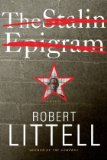Summary | Excerpt | Reviews | Beyond the Book | Readalikes | Genres & Themes | Author Bio

Critics' Opinion:
Readers' Opinion:
First Published:
May 2009, 384 pages
Paperback:
Jun 2010, 384 pages
 Book Reviewed by:
Book Reviewed by:
Derek Brown
Buy This Book
"Osip Emilievich! What brings you out on a night like this? It's New Year's Day according to the old style Julian calendar. So happy new year to you, friend."
The voice came from an unshaven ruffian holding court at two tables dragged together at the back of the canteen. The five young women around him, all wearing padded winter overcoats and sipping what I supposed to be vodka from tea glasses, turned to gape at us as if we were ghouls wandered in from a cemetery. I could tell from the way Mandelstam saluted the speaker with his half-raised walking stick that he wasn't sure of his identity; Mandelstam often had a hard time putting names to faces when people were out of context.
"Hello to you, Ugor-Zhitkin," I called, and I could see my husband nodding in relief as he grasped the identity of his interlocutor.
"Ugor-Zhitkin, at long last," my husband exclaimed, turning from the seller of Bulgarian cigarettes. "I have been leaving messages with your secretary for weeks."
"This time of year is always a madhouse," Ugor-Zhitkin grumbled, as if that would excuse his failure to respond. "A thousand and one things to do, a thousand and one people to see..."
Mandelstam had learned from Pasternak, two or three months before, that the editor Ugor-Zhitkin was offering hard cash for original manuscripts for the new Literary Fund Library. The only manuscripts my husband possessed, of unpublished (and according to our literary minders, unpublishable) poems, had been written out by me, and he would not part with these even if someone were reckless enough to want them. We were desperate for money -- my translation work had dried up as Mandelstam had become non grata in the literary world, and we were ashamed to ask Pasternak or Akhmatova for yet another loan that we had no hope of repaying. Which is how we came up with the scheme of concocting a manuscript that Mandelstam could then pass off as an original and sell. Bent over our small linoleum-covered kitchen table with a crust of bread under one leg to keep it from wobbling, he copied every poem from the original green-covered edition of Stone, his first published volume, into a grade school exercise book. The chore took the better part of two full days. Getting it to look authentic became something of an obsession with us. Mandelstam remembered or invented earlier versions of some of the poems and filled the pages with crossed-out words and lines. When he finished we took turns thumbing through the exercise book until the edges of the pages became dog-eared, after which we aged the manuscript by baking it under a low flame in a neighbor's oven until the paper turned brittle and yellow. Throwing himself into the project, Mandelstam even went so far as to copy off cryptic notes to himself and a recipe for Polish borsht (a heavy-handed reference to his having been born in Warsaw) on the blank pages. The finished product was carefully wrapped in a page from a 1913 newspaper that I pinched from the university library, and personally delivered by Mandelstam to Ugor-Zhitkin's secretary, who agreed to bring it to her boss's attention the moment he returned to Moscow.
"Come drink in the new year with us," Ugor-Zhitkin was saying, waving to the free chairs at the end of the two tables. He was clearly hoping to avoid the subject of Mandelstam's original manuscript of Stone. "The girls and I" -- the females at the table, who enjoyed the reputation of being his protégées, were counting on Ugor-Zhitkin to use his considerable influence to get their short stories or poems or plays into print; what they gave him in return for this service was the subject of more than one supper conversation in Moscow -- "the girls and I are celebrating something beside the Julian new year. Listen, Osip Emilievich, this is a great occasion in Soviet history. We've just come away from seeing our first talking motion picture. Surely you've read the fabulous review in Pravda -- there are some who are convinced that Stalin himself wrote it since he is known to admire the film. I'm talking about Chapayev, by the Vasilyev brothers. It's based on the Furmanov novel about the Civil War hero Vasily Chapayev."
Copyright © 2009 by Robert Littell




I find that a great part of the information I have was acquired by looking something up and finding something else ...
Click Here to find out who said this, as well as discovering other famous literary quotes!
Your guide toexceptional books
BookBrowse seeks out and recommends the best in contemporary fiction and nonfiction—books that not only engage and entertain but also deepen our understanding of ourselves and the world around us.